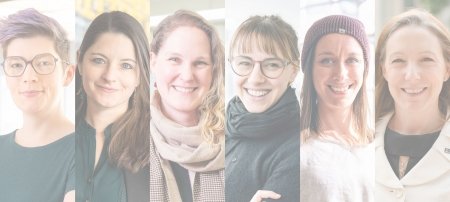A persistent team of individuals had a dream: More Michigan Tech faculty from underrepresented minorities, better retention of those faculty and something even more important—a change to a more inclusive campus culture.
Original efforts began with former Provost Leslie Lovett-Doust and a team of faculty who earned a $500,000 ADVANCE grant in 2008 from the National Science Foundation (NSF) to develop a recruitment program that would attract more women to Michigan Tech. Now, NSF has granted Michigan Tech Faculty Adrienne Minerick, Patricia Sotirin, Sonia Goltz, Andrew Storer and Audrey Mayer $1 million to continue the work. The three-year grant will focus on four initiatives:
- The ongoing AMP-UP program. More than 70 faculty and staff have already signed on as AMP-UP volunteers.
- An adaptation of the University of Michigan’s STRIDE faculty development program.
- Adaptation of North Dakota State University’s FORWARD Allies and Advocates
- An adaptation of the Department Enhancement Program at Iowa State University.
ADVANCE Matrix Process for University Programs
Anita Quinn, a policy and planning analyst in the Provost’s office, coordinated the many moving parts of the AMP-UP pilot, helping them work together and keep moving steadily toward their goal.
“This is not just about high-level initiatives,” says Quinn. “It includes work at the ground-level, collecting and analyzing data and making sure that initiatives are actually implemented.”
The team created AMP-UP (ADVANCE Matrix Process for University Programs), a data-driven, continuous improvement process to improve faculty retention, satisfaction and career progress. AMP-UP addressed scholarship and research dynamics, unit climate and dual career issues. A LEAN-inspired process, AMP-UP helped to design programs to intervene and correct issues and added the framework for continuous improvement.
Adrienne Minerick, dean of the School of Technology, explains how the new ADVANCE grant will grow from the AMP-UP pilot and draw from the strengths of other University programs.
Sonia Goltz, a professor of organizational behavior in Michigan Tech’s School of Business and Economics, adds: “AMP-UP was instrumental to understanding key career obstacles on campus as well as what programs could be used to address those problems. So, the three additional programs that are being adapted from other institutions were chosen based on the AMP-UP discussions that occurred in the past few years. The application of continuous improvement has been done at other universities, but has rarely been done in the academic arm.”

Making Programs Unique to Michigan Tech
Michigan Tech will rework the programs to fit our University’s culture, says Patricia Sotirin, professor of communications in the Department of Humanities. “We are inspired by, but not bound to, the work of other ADVANCE teams,” Sotirin explains. “We look forward to the collaborative development of programs that are responsive to Tech’s uniqueness and that open new possibilities for campus change, equity and success.”
Examples of the programs include Tech’s adaptation of the suite of STRIDE faculty development programs, which is already underway with the early career management committees piloted and institutionalized at Michigan Tech. Future efforts will focus on associate professors to address retention after tenure. FORWARD Allies and Advocates uses restorative justice and broad engagement to change university culture. It does this by training men as allies and advocates who can influence from within the faculty.
Andrew Storer, dean of the School of Forest Resources and Environmental Science, is an outspoken advocate for gender equity.
"This grant provides a great opportunity to realize an enduring return on the investments we make in faculty with diverse backgrounds and perspectives. The project represents a challenge to everyone at Michigan Tech to undertake changes in culture so that our opportunities for career progression represents the values, standards and expectations of this institution, rather than the standards and expectations that have been passed down through generations and convey an archaic image of academia."
Those changes will be grounded in data. Adaptation of Iowa State’s ADVANCE Department Enhancement Program will include analysis of factors affecting productivity, promotion and retention of faculty, based on a database already developed by AMP-UP and a University-wide campus climate survey.
“A primary focus of this analysis will be factors affecting the climate and advancement for women and under-represented minorities,” Minerick says. Analysis results and strategies will be shared with faculty and chairs to assist them in implementing action plans. AMP-UP will also coordinate a year-long professional development program adapted from Iowa State’s orientation program, to help our chairs become change leaders, she explains.
Path to Success
Minerick has a personal interest in this work. From a single-parent, low-income family herself, she managed to build a successful academic career.
“Most of my friends did not,” she says. “Structures that impede the success of certain individuals disturbs me to my core.”
Audrey Mayer, associate professor of ecology and environmental policy in the School of Forest Resources and Environmental Science, assistant to the provost for diversity, equity and inclusion, observes that it’s personal for many on campus. Policies and biases that impact people’s families, health, career trajectory and behavior can disproportionately affect people who do not fit the dominant culture.
So, what will success look like?
“We hope to see measurable increases in retention of women, under-represented minorities and intersectional faculty at Michigan Tech within the next 3 years,” Minerick says. “Ultimately, we aim to evolve our STEM culture to embrace different perspectives and experiences such that all individuals find this a place to thrive in their careers.
Michigan Technological University is an R1 public research university founded in 1885 in Houghton, and is home to nearly 7,500 students from more than 60 countries around the world. Consistently ranked among the best universities in the country for return on investment, Michigan's flagship technological university offers more than 185 undergraduate and graduate degree programs in science and technology, engineering, computing, forestry, business, health professions, humanities, mathematics, social sciences, and the arts. The rural campus is situated just miles from Lake Superior in Michigan's Upper Peninsula, offering year-round opportunities for outdoor adventure.






Comments